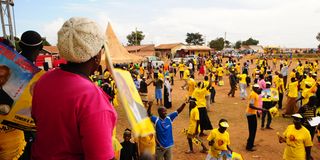Invest cautiously as election period takes shape - economists

NRM supporters during a campaign ahead of the 2016 General Election. PHOTO/FILE
What you need to know:
Although the general election is exhibiting some high stakes, there is no indication that the forth coming electoral exercise will be differently from the previous one.
Investors, whether local or foreign, love predictability because it guarantees them returns on their investments.
But with elections months away, economic experts and business leaders, advise businesses especially local Micro, Small and Medium Enterprises (MSMEs) to consider making prudent review of their strategy going forward—post election.
Top of the list should be cautiousness because general elections and predictability are not often times synonymous.
Although the country’s general election, just months away, is beginning to exhibit some high stakes, there is no indication suggesting that the forth coming electoral exercise will be differently from the previous one, leaving the economy more stressed than it was before.
Don’t close your purses
Despite urging for cautious investment in the election period until the cycle comes to an end , the private sector development specialist, Mr Moses Ogwal Goli , is certain that SMEs do not have to worry even as the electoral exercise officially kicked off last week with nominations of 11 presidential candidates.
He said: “I don’t believe political environment is bad for local investors to invest in. We have held several elections before and we continued thereafter with our lives. So considering past experiences, I encourage local SMEs not to close their purses, though they need to be cautious.”
He continued: “But for long-term investment, investors may have to make a prediction and see if the person who may take over the presidency can bring predictability or not. That answer is in the affirmative.”
Mr Goli also encouraged the Micro, Small and Medium Enterprises (MSMEs) to take advantage of the election period, though short. He said consumption related to election exercise such as making posters, supplying foods and drinks shouldn’t pass by but tapped into while making the most of ‘Buy Uganda, Build Uganda’ initiative.
In the context of Covid-19 pandemic, most of the economic opportunities that Mr Goli alludes to, may not be feasible because of the containment measures issued by President Museveni to suppress the spread of Coronavirus disease among the population.
In an interview, the Makerere University School of Economics lecturer, Dr Fred Muhumuza noted that unlike before, the months of official electioneering period may not be of any tangible economic benefit, save for the economic shock and social distress that the population should brace for after the election.
According Dr Muhumuza, the sporadic nature in which the election money will be spent by politicians to have them elected will not help the economy, let alone the recipients of the money, majority of whom will part with about a Shs1,000 or so in average, an amount of money that has no significant impact in terms of changing livelihoods.
The biggest loss, he said, is for those who are a little bit more structured in their operations, thanks to Covid-19 pandemic and its resultant containment measures.
He said: “There is a man or a woman out there who would have made Shs8,000 per plate for hundreds of people. Now that person is being told to prepare food for not more than 70 people because of the Covid-19 containment measures.”
He continued: “That is lost business for the person cooking the food, the supplier of chairs and utensils that could have been hired and the farmers selling produces are affected. It is a whole chain of things.”
Although one will argue that billions of shillings will be spent among the electorate, that to, he said will be too small to have meaningful change in the lives of the electorate and MSMEs running businesses.
According to the Research Fellow with the Economic Policy Research Centre, Corti Paul Lakuma, despite the effect of election investments, let alone on inflation and interests rates, there should not be need for alarm.
“I expect investments to reduce during this period. But the economy will pick up again shortly,” he said.
Any benefits?
Electioneering
The five or so months of official electioneering period may not be of any tangible economic benefit, save for the economic shock and social distress that the population should brace for after the election, Dr Fred Muhumuza, the Makerere University School of Economics lecturer says.




